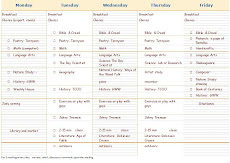Here is a PDF of White's Elements of Style. I've used this with a couple of my middle-schoolers.
I think that the way to approach the writing part of this is to just write myself some study guides. Something I tend to resist, but on the other hand, what I'm doing now is causing me stress. So that is going on my to-do list.
Kristie mentioned Write with the Best and it does look interesting. It looks like it uses excellent models to teach general composition principles.
Charlotte Mason says a bit about composition for the middle school years in Philosophy of Education (I emphasized the main practical points):
Forms III and IV. In these Forms as in I and II what called 'composition' is an inevitable consequence of a free yet exact use of books and requires no special attention until the pupil is old enough to take of his own accord a critical interest in the use of words.There are more exam questions -- here.
The measured cadences of verse are as pleasing to children as to their elders. Many children write verse as readily as prose, and the conciseness and power of bringing their subject matter to a point which this form of composition requires affords valuable mental training. One thing must be borne in mind. Exercises in scansion are as necessary in English as in Latin verse. Rhythm and accent on the other hand take care of themselves in proportion as a child is accustomed to read poetry.
In III and IV as in the earlier Forms, the matter of their reading during the term, topics of the day, and the passing of the Seasons, afford innumerable subjects for short essays or short sets of verses of a more abstract nature in IV than in III: the point to be considered is that the subject be one on which, to quote again Jane Austen's expression, the imagination of the children has been 'warmed.' They should be asked to write upon subjects which have interested them keenly.
Then when the terminal examination comes they will respond to such a question as,––"Write twelve lines (which must scan) on 'Sir Henry Lee,' or 'Cordelia,' or Pericles, or Livingstone," or, to take a question from the early days of the War, "Discuss Lord Derby's Scheme. How is it working?"; or, (IV) an essay on "The new army in the making, shewing what some of the difficulties have been and what has been achieved."
From this, it sounds like writing ought to be a natural progression from reading and thinking. In addition, teaching ought to be mostly informal and targeted towards areas where the child himself sees lacks.
There is a paper on Written Exercises in the Ignatian method of teaching. It is somewhat different from CM's methods, but has some similarities as well.



No comments:
Post a Comment